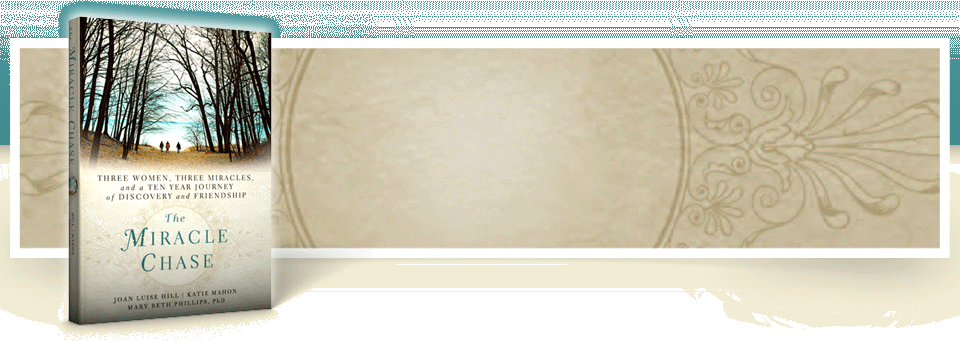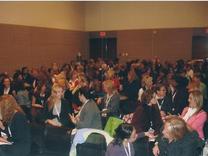Saving Grace - Resilience
by Miracle Chasers on 07/19/12
Whoever tries to keep his life will lose it, and whoever loses his life will preserve it. (Luke 17.33) All four Gospel writers quote Jesus saying something like this. And the message, shared with me by Sister Mary Dominic, has kept me alive in a certain kind of way. While the good Sister wanted to teach us third graders about the benefits of literal martyrdom as a sure way to heaven, the idea that I could lose everything and still live well has been in the back of my mind ever since.
My career goal was to be a Dean of Students in a university. I was in class, getting my PhD for that purpose, the day Liz was shaken by our neighbor's nanny. They had employed a nanny for their own baby daughter and I left Liz at their house for my three hour afternoon class. This decision would change my entire life, and Liz, forever.
Liz, my first child, almost died that day, shaken violently by the nanny. As a result, Liz was left totally blind.
I equate my experience of Liz's abuse in this way: You are going along with all your life's dreams like eggs in a basket, doing your very best to watch your step and attend to each egg, when suddenly, out of the blue, something or someone whacks your arm from underneath, sending those eggs into the air, sky-high. Frantically, you scramble to catch them, hoping to get them all back unscathed. Fortunately, some land safely in the basket's soft grass. But some crack open and break when they hit the earth. When you finally have the presence of mind to think about searching the ground around you, you find that some eggs miraculously remain unbroken and you gratefully place them back in your basket. Sadly, others have rolled away never to be found. No matter how hard you try, after this day, your basket is never the same. While the "eggs in the basket" metaphor is cliché, it captures perfectly how fragile life can be and how quickly life can change. When you are in this situation, you can feel uniquely singled out by God or by Fate, quite alone, knowing that no one in the world can understand what it is to be you.
Resilience is something that even Oprah is talking about these days. Years ago, I wrote my dissertation about women who survived sudden, unexpected tragedies and took their losses and experience out into the world to change the very thing that had gone wrong for them. We have the resilience of these women to thank for tougher drunk driving laws, pool safety requirements, motorcycle helmets, and safety caps on pill bottles. While some would have us believe resilience is a personal trait (you have it or you don't), it really is a process. Current research confirms that being able to "bounce back" is actually a complex set of interactions between the individual and the environment and includes a group of protective factors that are found in one's community. While these factors cannot "innoculate" against trauma, when available, identified, and taken by the individual, they may be able to provide crucial elements at critical times. This resilience process supports a sense of well-being and the ability to cope with a challenging life experience.
If we think about these "protective factors" from a spiritual point of view, we are actually talking about ways in which we can be an "instrument of peace" as Saint Francis prayed to be. Some spiritualists might talk of these opportunities as "the Universe conspiring" and sometimes we can think of these moments as coincidences, or even miracles. I think of them as examples of human Grace.
Grace is the young mother who, after my presentation on life transitions for blind children, came up to me and told me she managed an apartment complex in Berkeley that she thought might just meet Liz's needs. Grace is the friend who knows that after being laid off from work and then breaking her arm, her friend needs a day at the ocean and takes her there. Grace is the good preschool that offers encouragement and behavioral supports to the young child and his mother when the four-year-old starts to have trouble at school because Dad's been deployed for the second time in the child's short life. Grace is the friend who encourages the couple going through a difficult time in a marriage to open up instead of shut down. Grace is the friend who mentions that there is a job opening at her agency to a young father out of work. Whether it is concrete support during a life transition, emotional support in a time of need, or providing information, personal connection and practical assistance, Grace is something we all have an opportunity to offer when the basket is suddenly upended and there are eggs in the air.
If I get this right, to paraphrase my philosopher daughter, Aristotle believed that living well consists in actively pursuing your life goals and plans - the things that give your life value - in a thoughtful, practically reasoned, and distinctly human way. But given the sudden, unexpected and often life-changing events inherent in living, when we are derailed, we need active support to promote and shore up our well-being. When the winds blowing against us are too strong, we need real, concrete engagement from our community. Human flourishing and resilience depend very much on this kind of Grace. While prayer groups, monetary donations, and food and clothing drives are important, Grace, the kind I am talking about, is not a distant event; it is close up and personal. We sometimes tend to think of adversity as a human failing. The Grace we have to offer each other - Human Grace - is the antidote to that kind of thinking. Our individual response to someone who is going through a challenging time can be the very wind that fills the space left by our losses - the wings of Grace which lifts the kite and helps it fly.







